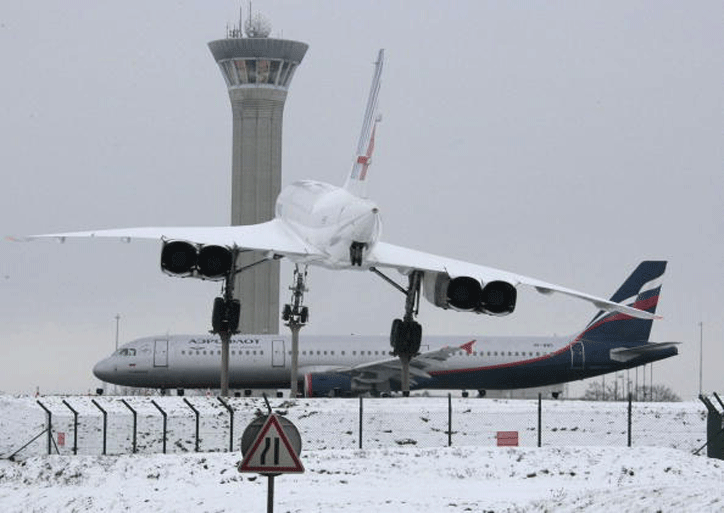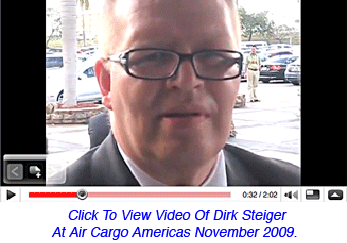J'accuse! Label Russia
Air
Cargo Pirates

Aeroflot Russian Airlines
posted a net profit of USD$85.5 million in fiscal 2009—an increase
of 260 percent year-on-year. Analysts value this as an astonishing result
since the turnover went down by 27 percent to USD$3.35 billion and a 4
percent passenger deficit was announced by the Moscow-based airline.
The item ‘airline revenue agreements’
mentioned in the balance sheet indirectly points to one reason why Aeroflot’s
gains went through the roof. This little known item bundles all revenues
resulting from code-sharing contracts with foreign airlines plus the royalties
non-Russian carriers have to pay for crossing Siberian territory on routes
between Europe and the Far East.
As Air Cargo News FlyingTypers
has learned, Moscow’s transport ministry in general demands one
million dollars per roundtrip per year from foreign carriers, bringing
it up to seven million if the flights are conducted daily. Aviation experts
say that the exact amount to be paid, however, is subject to bilateral
agreements.
“Because the Russian government doesn’t
make any figures public, there is plenty of room for speculation about
the sums flowing in from foreign competitors,” states a former Aeroflot
manager.
 The payment is in line with statistics delivered
by analyst Dirk Steiger (right) of Frankfurt-based Aviainform GmbH who
speaks of costs of USD$60,000 for conducting a single roundtrip via Russia.
The payment is in line with statistics delivered
by analyst Dirk Steiger (right) of Frankfurt-based Aviainform GmbH who
speaks of costs of USD$60,000 for conducting a single roundtrip via Russia.
“Somehow, this is an act of modern
piracy,” he exclaims, outraged.
That’s not all by far. Royalties highly
distort competition between Russian carriers by also favoring state-run
Aeroflot while others like Transaero Airlines, Atlant Soyuz and Siberian
S7 Airlines have to earn their money on strictly commercial terms.
The only other profiteer besides Aeroflot
is carrier AirBridge Cargo, which is part of the royalties’ deal
based on an arrangement with Japanese carrier Nippon Cargo Airlines (NCA).
NCA agreed to channel their ‘contribution’ directly into the
treasures of Volga Dnepr subsidiary ABC for being allowed to cross Russian
airspace.
In addition to royalties, airlines have
to pay navigation charges when flying to Russia destinations or crossing
the country. “These charges, based on distance flown, are in accordance
with common international practice,” comments analyst Steiger.
Royalties have for a long time been a major
financial source for the Russian government to subsidize the ailing domestic
aviation sector. From the very beginning, the EU Commission together with
the Association of European Airlines—AEA—filed protests, without
visible result. Originally the monies collected were to be utilized to
improve the poor infrastructure of the country’s major airports,
but that has not happened. Instead, the money has gone directly into Aeroflot
revenue and—to a minor part—ABC, assure aviation experts.
This scandalous practice means that international competitors like Air
France-KLM, Asiana, NCA, Korean Airlines, Lufthansa and British Airways,
just to name a few, are financially supporting state-owned carrier Aeroflot
(51.17%) and Moscow-based line-haul operator ABC.
One capacity provider that doesn’t
participate in this game is Cargolux of Luxembourg. The airline crosses
Siberian skies only in the case of urgent, time-sensitive shipments.
“We refrain from flying over Russian
territory whenever possible and circumvent the country instead due to
cost aspects,” confirms the airline’s spokesperson, Jeannot
Erpelding. Consequently, CV routes its freighters mainly via Baku in Azerbaijan
and Kazakhstan’s Almaty on their east-west roundtrips. But if oil
prices should soar again, it might be a better option to pay royalties
instead of avoiding Russia airspace because flying the longer southern
routes increases kerosene consumption and costs. Ultimately, the routing
of the aircraft is a matter of calculation.
As a prerequisite for becoming a member
of the World Trade Organization (WTO), Russia may have to shelve its one-sided
royalties’ regime and agree to reducing customs tariffs, import
duties, and abolishing all barriers to free trade. However, the date for
this has not been defined after years and years of talks.
Heiner Siegmund |



